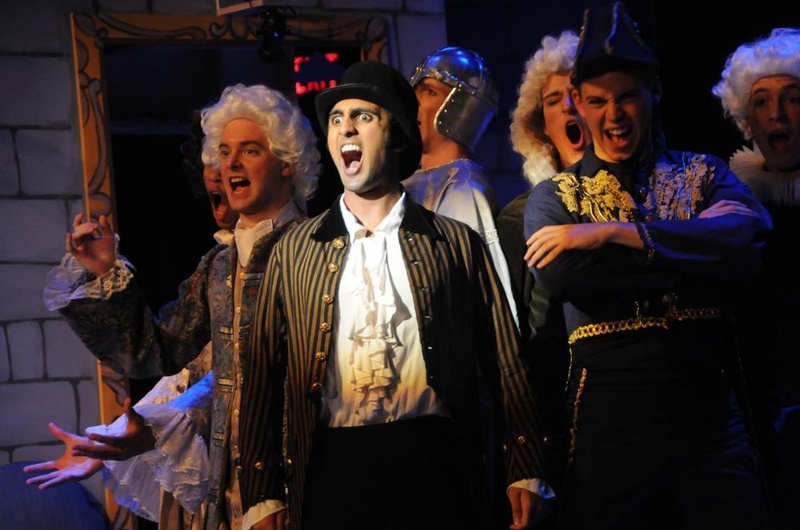If “Ruddigore, or the Witch’s Curse” is concerned with, above all, what one ought to do in certain situations, let it be made clear that one ought not to persecute witches. This lesser known Gilbert and Sullivan operetta—presented by the Harvard-Radcliffe Gilbert & Sullivan Players at the Agassiz Theatre through November 14—recounts the tale of the cursed line of the baronets of Ruddigore, who are plagued by a witch’s spell. The production, directed by Crimson arts comper Joshua R. McTaggart ’13, navigates a very fine line between amusement and tedium, landing more often on the former.
The witch’s curse demands that the baronets commit one heinous crime every day or suffer a horribly slow and painful death. More specifically, the story of “Ruddigore” focuses on one “bad baronet” who flees his fate, taking on a new identity as the strapping farmer Robin Oakapple (Jonathan K. Stevens ’14). Ultimately, Robin must assume his noble title, Sir Ruthven Murgatroyd, and find some way to thwart his family’s curse.
With a corps of professional bridesmaids, a tap-dancing sailor, and a team of vivified portrait paintings, “Ruddigore” certainly has enough oddity to entertain. Comical secondary characters like Dame Hannah (Amelia H. Ross ’14), Old Adam Goodheart (Eli E. Kahn ’13), and Mad Margaret (Ashley N. Kaupert ’12) provide oft needed comic relief when the plot thickens into an opaque soup. If you can keep track of who’s marrying whom and why, you should receive some sort of prize from the Players.
“Ruddigore” also contains several musical gems that ground the production from floating into oblivion. “I Know a Youth” is a lovely duet performed by Robin and Rose Maybud (Liv A. Redpath ’14), in which the characters confess their love for one another while pretending to refer to some other friend. The finale of the first act exhibits a serious case of “musical A.D.D.” (as noted by Music Director David R. Sawicki ’12 in his program notes), that at its finest moments, includes several sections of ensemble a cappella. In these passages of layered vocal interplay, the cast surely outshines its orchestra. The second act includes several successfully ghoulish numbers by the ghosts of baronets past (who spring to life from a portrait gallery) and the show-stopping patter trio, “My Eyes are Fully Open.”
Unfortunately, the standout performances from “Ruddigore” come from the secondary characters. While Stevens and Redpath are both somewhat endearing, they lack real chemistry onstage, making their duets awkward. Ross and Eric Padilla ’14 (as Sir Despard Murgatroyd) are clearly the vocal standouts. Caked in dark purple lipstick and eye shadow, Ross’s sardonic glare proves a welcome contrast to the hyper-sprightly Rose and her bridesmaids. As Dame Hannah, her smooth, husky voice easily fills Agassiz Theatre with a balanced vibrato. Padilla’s crooning is morbid in act one, then charming in act two, his characteristic stare both icy and silly.
Of course every production has its highs and lows, and the orchestra for “Ruddigore” was largely responsible for the latter. A perpetually out-of-tune string section marred otherwise enjoyable songs. A shaky brass section surely did not help to ease that pain. And while the cast displays commendable vocal talent, the acting is often awkward, over-the-top, or just bizarre (e.g. the gaggle of ghost baronets who emerge from portraits in the second act). Several technical defects threatened to throw off the cast, although Kaupert (as Mad Margaret) used them to her comedic advantage.
In the Director’s Note, McTaggart explains that his primary objective with “Ruddigore” is to provide pure entertainment, and he succeeds to a great degree. “Ruddigore” is actually funny, and generally the cast radiates an earnest lightheartedness that pervades the entire show. If there is any way in which McTaggart’s production is not entertaining, it is only that “My Eyes are Fully Open” may seem, at times, a taunt: at nearly three hours (including a 20-minute intermission for set changes), sitting through “Ruddigore” is a serious commitment for any theatergoer.
Read more in Arts
Ozick Mimics James in ‘Foreign Bodies’













